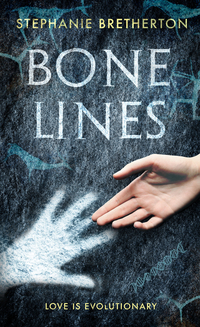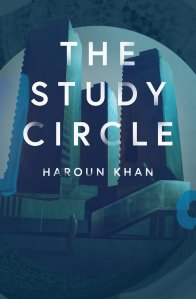 Sometimes two books come along that, despite being about totally different subjects, unexpectedly end up feeling surprisingly similar. So it was with Haroun Khan’s The Study Circle (Dead Ink Books) and Stephanie Bretherton’s Bone Lines (Unbound) – both big novels about big ideas, which unashamedly embrace the novel as a vehicle for wrestling with them. It’s a welcome discovery to find the ‘novel of ideas’ alive and well in 2018, and although the plotting in neither novel is perfect, you’ll certainly come away from them both feeling invigorated and challenged.
Sometimes two books come along that, despite being about totally different subjects, unexpectedly end up feeling surprisingly similar. So it was with Haroun Khan’s The Study Circle (Dead Ink Books) and Stephanie Bretherton’s Bone Lines (Unbound) – both big novels about big ideas, which unashamedly embrace the novel as a vehicle for wrestling with them. It’s a welcome discovery to find the ‘novel of ideas’ alive and well in 2018, and although the plotting in neither novel is perfect, you’ll certainly come away from them both feeling invigorated and challenged.
First, then, to The Study Circle, which opens on the top floor of a London tower block, where a group of young Muslim men meet regularly to study the Qu’ran. Ishaq, the novel’s protagonist, sits surveying “the diversity and unity around him. Black, brown and white. Brothers in Islam, all listening with intent, deliberating on an eternal and unalterable message.” Outside all is grey: “a sterile panorama of ashen granite.” It’s an unusual starting point, really – after all, the prevailing wisdom of so many ‘how-to’ write books is to start with the drama, and so Haroun Khan’s willingness to resist this is the first clue that The Study Circle is a much stranger and more thoughtful book than its blurb might suggest.
Bone Lines, by contrast, starts much more dramatically, with a heavily pregnant, pre-historic hunter venturing out from a “ghosted woodland” to the open wastes beyond in search of food: thousands of years later, her body is found buried in a hidden crevasse on Mount Kenya. It’s compelling and vivid, suggesting a propulsive and startling narrative to come – and yet within a couple of chapters, Stephanie Bretherton’s elegant prose instead ventures into more philosophical territory, with the novel’s modern scenes exploring evolutionary biology and humanity’s shared ancestry in some depth. There’s a boldness to what both Khan and Bretherton have attempted here, a breadth of vision, that’s really admirable.

Khan’s rendering of London makes the city into a character of its own – not least when it comes to the estate, a tangled swirl of concrete. More impressive still, though, is the novel’s characterisation: every character seems to reveal a different experience of Islam, from Ayub, the study circle’s traditionalist, conservative leader, trying his best to provide a foundation for a younger generation, to Zulfi, the polished project manager who’s trying to shut down any “you know, cultural vestiges, ghettoised mindsets”. One of Khan’s most impressive achievements is showing the enormous breadth of views within Islam, and I think we’re meant to share Ishaq’s bewilderment about how any diligent young person is supposed to choose between them. There’s a subtlety to his portraits that gives each of them the air of authenticity, and also makes them much bigger than themselves.
Bretherton’s novel has a much smaller cast of characters, its modern scenes revolving chiefly around Eloise, the geneticist working on the case of ‘Sarah’ (the prehistoric hunter), and her fraught, abortive romance with her lab partner, KC. This has the unexpected consequence of requiring Eloise to carry an awful lot of the novel’s themes, often in passages like the one below:
Eloise did not want to be depressed, not today. Not with the archaeological find of a lifetime landing in her lap, one that would have sent her beloved father into academic nirvana. How proud, how happy he would have been for her, how intrigued to watch it all unfold… but when the rush of endorphins subsided, the cobweb of life’s ever-present banality caught her out.
The big issue is that Eloise’s introspection is something of a character flaw. She thinks deeply about everything, because that’s the nature of the novel, but it’s never acknowledged as an issue – even though it suggests Eloise has a rather isolated, detached way of being in the world. It also slows the narrative considerably. I thought of Rachel Cusk’s magnificent Outline while reading Bone Lines, a novel that manages to fuse philosophy and fiction to great effect: it made me wonder whether Stephanie Bretherton could have a bright future in creative non-fiction.
In truth, both novels are probably better at exploring a range of ideas than they necessarily are at crafting them into narrative form. The Study Circle explodes into occasional moments of violence, but the growing threats of the book’s second half aren’t always sustained (particularly because of some ill-advised shifts of perspective) and so the climax, whilst powerful, doesn’t have the same sense of inevitability as I think it was intended to. Bone Lines, too, is so interested in Eloise’s scientific and romantic life that a dramatic late-stage occurrence seems almost to sneak up on the reader – and, whilst very exciting, it feels a little at odds with what’s gone before. Of course, novels of ideas have always been like this (just look at Anna Karenina, or The Mill on the Floss) and if you’re willing to lose yourself in either book then you’ll likely forgive a little bagginess: there may have been a more elegant way to achieve their aims, though.
Nevertheless, I’d rather read a wildly ambitious, occasionally clunky novel than I would read a mediocre one. Yes, Khan’s prose sometimes lacks beauty and I would have cut Bretherton’s awkward letters between Eloise and Charles Darwin if I’d been her editor. But there are moments of sheer joy in both The Study Circle and Bone Lines – such as, in the former, a trip to get fried chicken that turns into a turbulent encounter with the police, or the terrifying late-night encounter with an old friend on a playground, and in the latter, the joyous conclusion to the story of ‘Sarah’, and any scene with Eloise’s lost lover Tom. The sheer, sprawling vision behind what both authors have attempted (and mostly achieved) is to be applauded: they will only improve from here.
The Study Circle is published by Dead Ink Books in October – you can buy it in hardback or paperback from them directly here, with a hardback £15.99 and a paperback £9.99. Buy it directly – they’ll get more money that way.
You can also follow Haroun Khan on Twitter here, and Dead Ink here.
Bone Lines was published by Unbound, a crowdfunding organisation that allows people to pledge money to particular, curated projects which Unbound will publish if the donation threshold is met. It’s a really exciting initiative, and one that’s well worth looking into here.
You can also follow Stephanie Bretherton on Twitter here, and Unbound here.
Thanks to Stephanie Bretherton and Dead Ink books for providing free copies for review.

